Public Events Schedule
All events are free, but please RVSP to confirm your attendance via EventBrite
Directions, maps, accessibility
Please note this is a scent-free environment.
The lectures and the roundtables will be recorded.
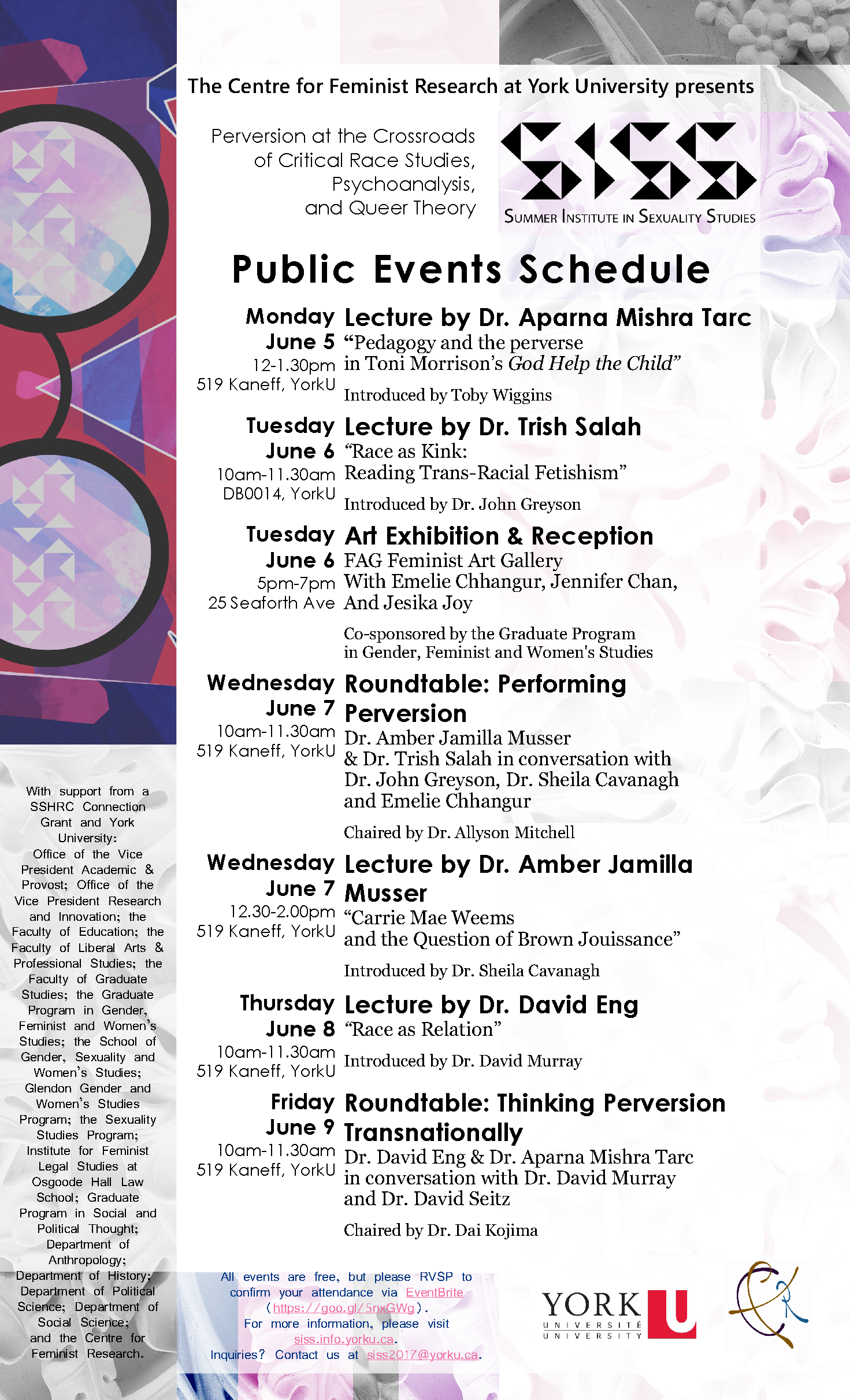
All events are free, but please RVSP to confirm your attendance via EventBrite
Directions, maps, accessibility
Please note this is a scent-free environment.
The lectures and the roundtables will be recorded.

“Pedagogy and the perverse in Toni Morrison’s God Help the Child”
Introduced by Toby Wiggins
Monday, June 5, 2017
12-1.30pm
519 Kaneff, YorkU
This lecture is situated in recent queer scholarship celebrating and/or recuperating perversion from its pathological treatment in the social sciences (Edelman, De Lauretis). Aligned with these moves, Aparna Mishra Tarc takes a different tact to thinking the perverse in a turn to Melanie Klein’s treatment of Freud’s polymorphous perverse baby subject to the adult (m)other’s sexual drives. In infancy sexuality driving the subject formation of the baby is open to impression as intra subjectively experienced and inter subjectively engaged. The intra subjective drive of sexuality instantiated in infancy is fundamental to human existence and wholly dependent on the inter subjective response and care of the (m)other. To examine how infantile sexuality is expressed and repressed in sexual and racial markers of identity, Mishra Tarc conducts a psychoanalytic reading of Toni Morrison’s God Help the Child. Morrison’s novel investigates personal, legal and societal responses to perverse expressions of the child’s sexuality generating, degenerating and regenerating the self. Subject to the other with sexual drives of their own, Morrison highlights the profound role of pedagogy in the care of the child’s polymorphous perverse existence. The adult’s response (use, refuse, and abuse) of the child’s sexuality sets the conditions for her identity and relation to others.
Click here for Dr. Tarc’s bio
See the event on Facebook
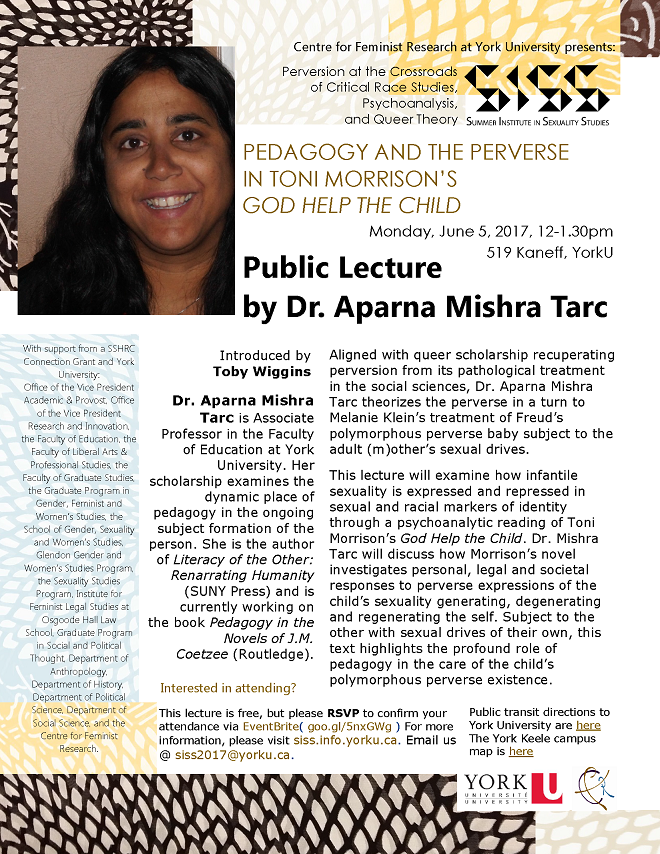
“Race as Kink: Reading Trans-Racial Fetishism”
Introduced by Dr. John Greyson
Tuesday, June 6, 2017
10am-11.30am
DB0014 (Victor Phillip Dahdaleh Building, formerly Technology Enhanced Learning [TEL] Building), YorkU
In what sense might we speak or think about race as libidinally charged? How do we understand racial identity as erotically invested and in what ways do we see object choice as racially inflected? To what extent are such libidinal economies of identity formation and object choice both ubiquitously alluded to and routinely disavowed? And what are the circumstances under which they present themselves as an occasion for scandal, crisis and conflict?
Drawing upon Freud’s discussion of the place of disavowal in the constitution of desire, this talk is an attempt to think about the persistence, and affective charge, with which analogies between transgender identities and forms of racial passing or cross-identification, increasingly named as “transracialism,” are made. In the process it will also attempt to put these concerns into relation with a few other questions. What is the legacy of phobic constructions of transsexuality as deviant and predatory masculinity in early lesbian and cultural feminist thinking for our present moment? Are there ways in which thinking through racialized desire and disavowal allow us to interpret, interfere with and revise our understandings of racialization, gendering, sexuation as such?
Click here for Dr. Salah’s bio
See the event on Facebook
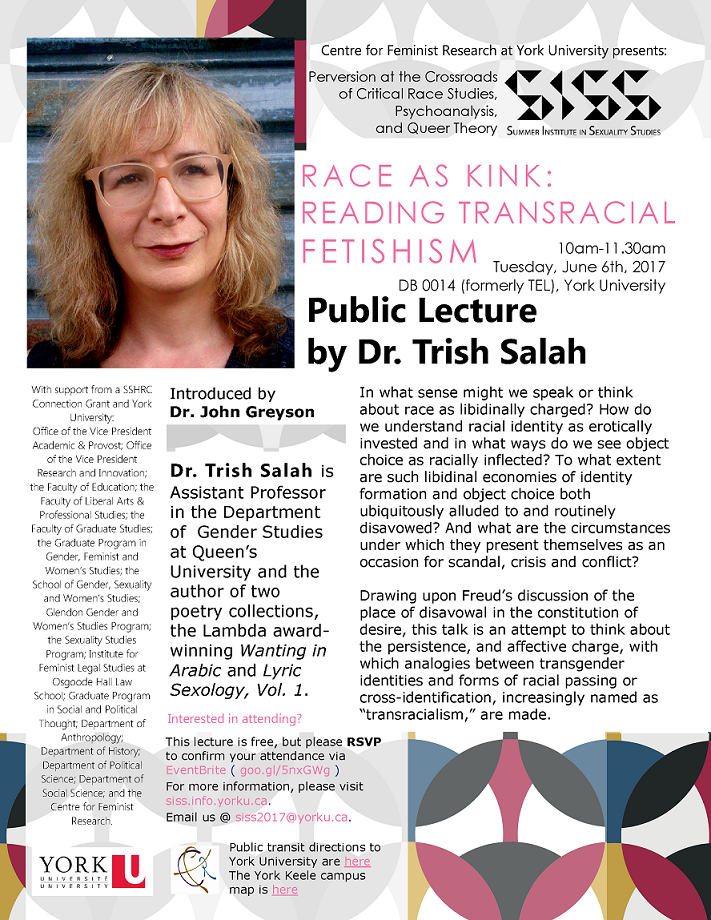
With Emelie Chhangur, Jennifer Chan, and Jesika Joy
Co-sponsored by the Graduate Program in Gender, Feminist and Women’s Studies
Tuesday, June 6, 2017
5pm-7pm
25 Seaforth Ave
Please note: the gallery is wheelchair accessible but the washroom is not.
See the event on Facebook
These three artists challenge assumptions about sexuality and disrupt typical representations of race and power. Through tactics of performance for the camera the works present visual questions about the gaze, decorum and the politics of perversion.
Emelie Chhangur, Quenched, 2003, 6 minutes
Description: We know not what we resist until the limits are exceeded. In a breathless performance work, the artist places redemption squarely on the side of perversion and the line to be crossed. “Laisser mille transgressions fleurir.”
Emelie Chhangur is an artist and award winning curator and writer based in Toronto, where she works as the Assistant Director/Curator of the AGYU. Over the past decade, she has developed an experimental curatorial practice in collaboration with artists. Recent projects include The Awakening a three-year multi-faceted participatory performance with Panamanian artist Humberto Vélez, no.it is opposition., an exhibition and two-year collaboration with Brazilian artist-curator Carla Zaccagnini, Imaginary Homelands, a three-year residency project and exhibition featuring the work of nine young Colombian artists, and the Centre for Incidental Activisms (CIA), a radical proposition of gallery “in-reach,” where participatory, activist, and research-based practices were emphasized over conventional methods of exhibition display. Her recent collaboration with Trinidadian artist Marlon Griffith is a large-scale public street procession programmed in conjunction with the Para Pan Am Games.
Chhangur is interested in how exhibitions and texts perform to create unique interpretative experiences as well as in finding ways to enact activisms from within an institutional framework. As an Assistant Director of a public, university-affiliated, contemporary art gallery, Chhangur believes that the contemporary art gallery must serve a social as well as aesthetic function. In fact, other than, as an artist making single channel videos and installations, which are shown nationally and internationally, questioning the nature and function of a contemporary art gallery is her primary art project at the moment.
Jesika Joy Subject to Subject 2006 4:24 minutes
Description: In Subject to Subject Joy uses her body as both palette and tool; the work is confrontational and manipulative, controlling what the viewer can and can’t see, despite her objectification through their gaze. Joy insists that it is impossible to separate the sexual from the political.
Bio: Jesika Joy is a Toronto based artist working in video and performance. Through exaggerating normalized social practice and incorporating abject imagery, she creates radical feminist interventions cloaked in a postmodern aesthetic.
Jennifer Chan Young Money, 2012, 7 minutes
Description: In her work Chan explores Internet fetish communities. Her focus is on the tension between mediated sexual fantasies and corporeal desires. She contains her findings in creative gestures, through which she strives for a better understanding of complex motivations and power structures. Young Money is about the interconnected nature of various capitals: cultural, social and financial.
With hypercontemporary remix video, this video indulges in the valorization of youth and newness in both art and the internet. Some like it hot, some like it sloshy. Young Money is a remix video that divulges Chan’s critical fantasies of white masculinity in relation to the internet. In these videos Chan draws continuances between micro-world of non-sexual online fetishes and young aspirations for sex(iness) and likeability.
keywords: white, boys, pizza, man, bromance, point of view, art, voyeur, american, catharsis, hole, glory, ebonics, taste, young, how to get rich, money, silver, gold, splosh, splash, wet look, hip hop, truth, burning
Dr. Amber Jamilla Musser & Dr. Trish Salah in conversation with Dr. John Greyson, Dr. Sheila Cavanagh and Emelie Chhangur
Chaired by Dr. Allyson Mitchell
Wednesday, June 7, 2017
10am-11.30am
519 Kaneff, YorkU
See the event on Facebook
“Carrie Mae Weems and the Question of Brown Jouissance”
Introduced by Dr. Sheila Cavanagh
Wednesday, June 7, 2017
12.30-2.30pm
519 Kaneff, YorkU
Carrie Mae Weems’ 1995-1996 installation “From Here I Saw What Happened and I Cried,” comprised of 34 photographic images from various archives (some of which were already in circulation) from the 19th and 20th centuries, provides an opportunity to meditate on the discourses of woundedness that permeate much thinking on race, affect, and masochism while also allowing us to theorize brown jouissance. Following Lacan, Amber Jamilla Musser takes jouissance to be the experience of being a body, what Nestor Braunstein describes as “positivity, […] ‘something’ lived by a body when pleasure stops being pleasure. It is a plus, a sensation that is beyond pleasure” (2003, 104). This lecture dwells on jouissance in order to retain the ambivalence of emotion that is provoked by Weems’ invocation of tears. Brown jouissance offers insight into thinking about this opacity as strategic, masochistic, and deeply connected to the flesh. Further, brown jouissance is not just adding race to Lacan’s concept, as Musser argues in her reading of Weems’ installation, it enables a rethinking of the relationship between psychoanalysis, femininity, and race.
Click here for Dr. Musser’s bio
See the event on Facebook
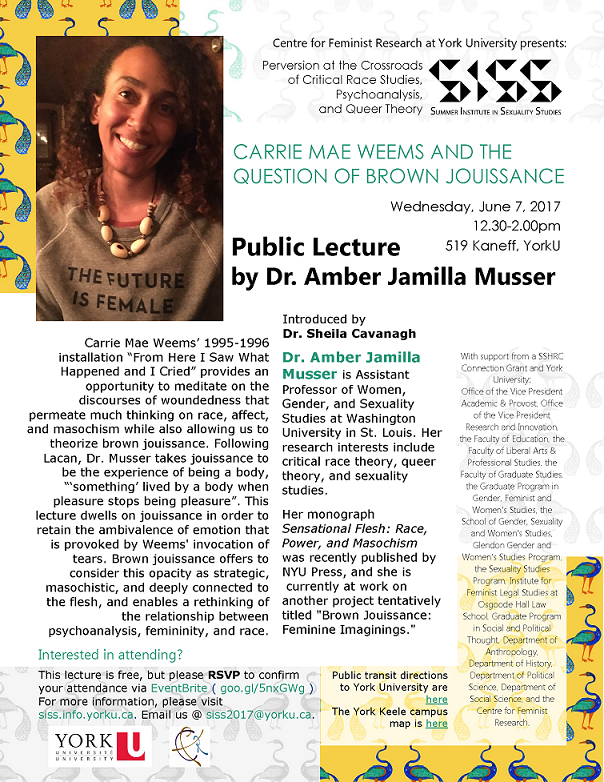
“Race as Relation”
Introduced by Dr. David Murray
Thursday, June 8, 2017
10am-11.30am
519 Kaneff, YorkU
This lecture begins with the premise that race is not a “thing” as it is commonly understood—an unchanging biological trait, a bodily attribute, a difference of blood quantum or color, a static identity. Rather, race is a relation—a continuous, modulating relationship among subjects mediating processes of social inclusion and exclusion. This talk investigates “race as relation” in both law and psychoanalysis. It begins with an account of the idea of race as it emerged from the Transatlantic slave trade and the objectification of the slave as property. While property is conventionally thought of as a subject-object relationship, it might be better understood as a subject-subject relationship, a set of rights and privileges shaping histories of racial inclusion and exclusion in U.S. law and society among subjects. The lecture then turns to psychoanalytic theories on subject-object relations in order to consider how they rework fundamental assumptions about race and property in U.S. law and society and, in turn, how histories of race challenge ideas of the universal subject in psychoanalytic theory.
Click here for Dr. Eng’s bio
See the event on Facebook
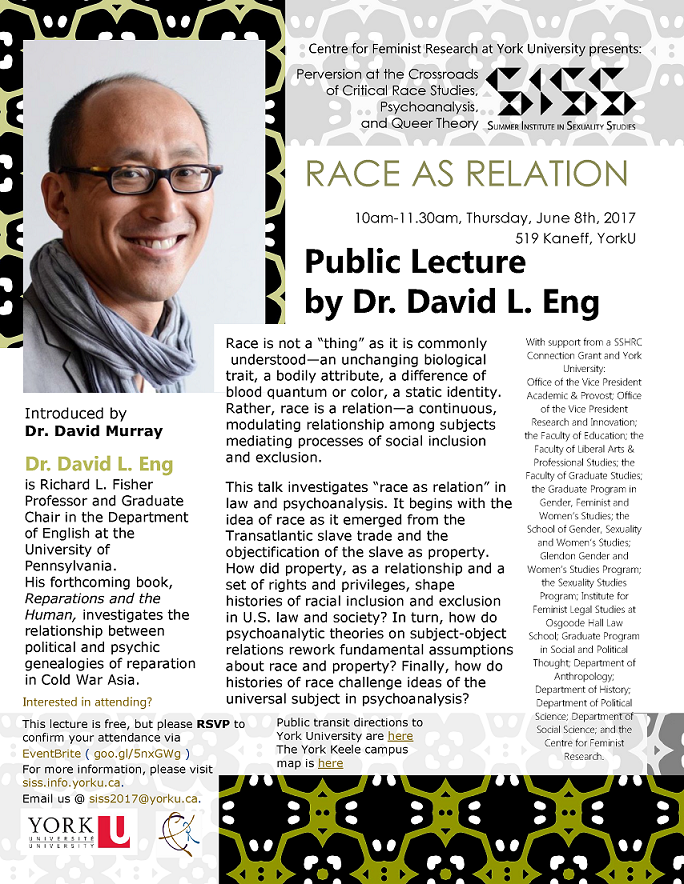
Dr. David Eng & Dr. Aparna Mishra Tarc in conversation with Dr. David Murray and Dr. David Seitz
Chaired by Dr. Dai Kojima
Friday, June 9, 2017
10am-11.30am
519 Kaneff, YorkU
See the event on Facebook